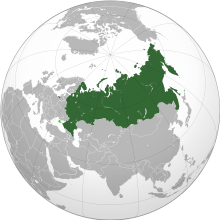LGBT rights in Russia
|
LGBT rights in the Russian Federation and the Soviet Union |
|
|---|---|

Russia
|
|
| Same-sex sexual activity legal? | Decriminalised in 1917; Re-criminalised in 1933; Legal since 1993 Age of consent stands at 16 since 2003 |
| Gender identity/expression | Legal gender change since 1997 |
| Military service | Non-official policy "Don't ask, don't tell" since 2003 |
| Discrimination protections | None |
| Family rights | |
| Recognition of relationships |
No recognition of same-sex relationships |
|
Restrictions:
|
Article 12 of Family Code de facto states that marriage is a union of a man and a woman |
| Adoption | No legal restrictions to adopt by a single person |
Lesbian, gay, bisexual, transgender (LGBT) persons in the Russian Federation face legal and social challenges not experienced by non-LGBT persons. Although same-sex sexual activity between consenting adults in private was decriminalized in 1993, same-sex couples and households headed by same-sex couples are ineligible for the legal protections available to opposite-sex couples and there are currently no laws prohibiting discrimination regarding sexual orientation. Transgender people are allowed to change their legal gender following sex reassignment surgery, however, there are currently no laws prohibiting discrimination regarding gender identity or expression and recent laws could discriminate against transgender residents. Homosexuality has been declassified as a mental illness since 1999 and although gays and lesbians are allowed to serve openly in the military, there is an unofficial "Don’t ask, don’t tell" policy.
Russia has been viewed as being socially conservative regarding homosexuality, with recent polls indicating that a majority of Russians are against the acceptance of homosexuality and have shown support for laws discriminating against homosexuals. Despite receiving international criticism for the recent increase in social discrimination, crimes, and violence against homosexuals, larger cities such as Moscow and Saint Petersburg have been said to have a thriving LGBT community. However, there has been a historic resistance to gay pride parades by local governments; despite being fined by the European Court of Human Rights in 2010 for interpreting it as discrimination, the city of Moscow denied 100 individual requests for permission to hold Moscow Pride through 2012, citing a risk of violence against participants.
...
Wikipedia
